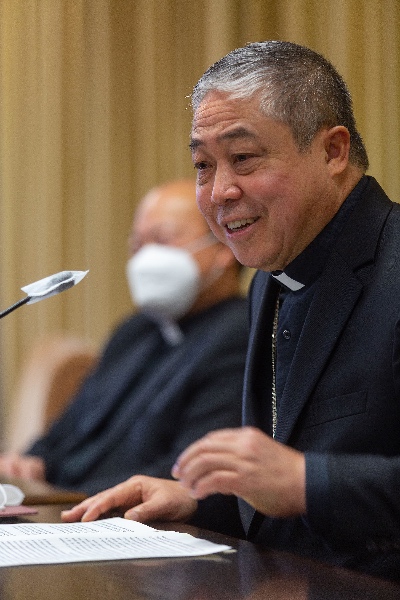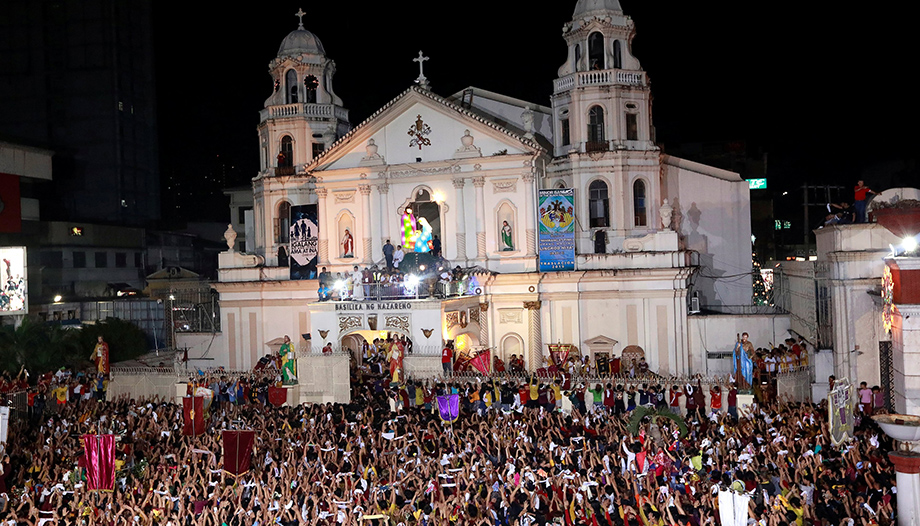The words of the Nuncio of His Holiness, Bishop Bernardito Auza, Filipino, are part of the visit he made to the Faculty of Theology, where he participated in a commemorative day of the V centenary of the evangelization of the PhilippinesFrancisco Pérez, Archbishop of Pamplona, and Bishop Ignacio Barrera, Vice Chancellor of the University of Navarra.
In his speech, Nuncio Auza highlighted some dates and the significance of the arrival of the first expedition that circumnavigated the world. The voyage of Ferdinand Magellan and Juan Sebastian Elcano in 1521, by which "the Gospel reached the Philippine Islands".
"The expedition of Ferdinand Magellan arrived in the Philippines, on the island of Samar, on March 16, 1521. On March 30 of the same month, Easter Sunday, the first Mass was celebrated on the island of Limasawa. On April 14, the first baptisms took place in Cebu. On April 27, Magellan died in the battle of Mactan. And, from that day until the return to Sanlúcar de Barrameda, Sebastián Elcano took command of what would be the first circumnavigation of the island. "to all roundness". of the world. These details come down to us, thanks to the chronicler of the expedition, the Venetian Antonio Pigafetta, who was one of the 18 surviving men".
Later would come "the true inauguration of evangelization", with "the arrival, in 1565 from New Spain, of the second Expedition of the Spanish Crown by the will of Philip II, the work of two Basques: Miguel Lopez de Legazpi (born in Zumarraga, Guipuzcoa, the year 1502; died in Manila the year 1572), and the Augustinian friar Andres de Urdaneta (born in Villafranca de Oria, Guipuzcoa, the year 1508 and died in Mexico the year 1568) and his Augustinian companions."
Today, five centuries later, the papal nuncio added, "the Philippines has 86 ecclesiastical circumscriptions with almost 100 million baptized. Between 85 and 87% of the total population is Catholic. The Filipino people practice their faith without complexes. The faith is publicly confessed and manifested through a lively popular religiosity".
For this reason, the Holy Father Francis, in his homily during the Mass of March 14, 2021 in St. Peter's Basilica, was able to say: "Dear brothers and sisters, five hundred years have passed since the Christian proclamation first came to the Philippines. You have received the joy of the Gospel: God loved us so much that he gave his Son for us. And this joy is seen in your people, it can be seen in your eyes, in your faces, in your songs and in your prayers. The joy with which you carry your faith to other lands".
15th and 16th centuries, the age of discoveries
Bishop Auza alluded to the call to "age of discovery", of the 15th and 16th centuries. "At that time, European navigators carried out truly transcendental feats," he said. And he mentioned "the three most spectacular and with the greatest impact on history. The first, the "discovery" of America in 1492 by Christopher Columbus. The second, the "discovery" of the spice route through the eastern passage, the work of the Portuguese Vasco da Gama, who reached Calicut (Kozhikode), in southwest India, in 1498, connecting the West with the East by the sea route.

The third, the "discovery" of the spice route through the western passage, the work of two great sailors: the Portuguese-Seville-born Ferdinand Magellan, who reached the Philippine Islands in 1521, where he died in the battle of Mactan (April 27, 1521) less than two months after the arrival of the expedition in the islands (March 16, 1521), and the Basque Juan Sebastian Elcano, who completed the first circumnavigation, the first round-the-world voyage, passing through the Spice Islands on the way back to Sanlúcar de Barrameda by the eastern route, despite the Portuguese threats for clearly skipping the Treaty of Tordesillas of 1494".
"This third great historical event," said Nuncio Auza, "is the one that interests our dissertation now, because it was thanks to this voyage of Magellan and Elcano that the Gospel reached the Philippine Islands. At this point, I still have to specify that while the first baptisms took place in Cebu on April 14, 1521, the death of Magellan in the battle of Mactan (two weeks later, on April 27) caused the immediate departure of the survivors of the Expedition, since then under the command of Sebastian Elcano, in the direction of the islands of the spices, until the return in Sanlucar de Barrameda by the eastern route".
Missionaries, "great heroes of human rights".
At this point, Monsignor Auza went directly to evaluate the evangelizing action from the point of view of human rights and perspective. "In spite of the controversies, errors and abuses during the times of "discoveries" and colonization", he affirmed, "the achievements of those times cannot be denied or disregarded. Spain has to be proud of the prowess of the globalization of the modern era, and of its contribution, through centuries, to the historical formation of the civilization we know today".
Indeed, he stressed, "Magellan's action, and before that of Columbus, with his voyages and explorations, resulted in the generation of new knowledge, identities, values, mixtures of peoples and cultures. We could say that they created a "Hispanic identity" in the New World, in particular with a language and a religion. In Spain, the evangelizing experiences of many missionaries who fought to defend the human rights of the indigenous people raised awareness of this unavoidable aspect of society and coexistence among peoples. In this field it is worth mentioning, for example, the Dominicans Antonio de Montesino in Santo Domingo and Venezuela. Bartolomé de las Casas in Chiapas and Central America. And in Manila, Domingo de Salazar".
"In the context of our times," the Philippine nuncio said, "I have no doubt that these missionaries must be recognized as great heroes of the human rights of indigenous peoples. While the United Nations Declaration on the Human Rights of Indigenous Peoples Indigenous Peoples' Rights was adopted in 2007, only twenty-five years ago, already in 1511, in Santo Domingo, Antonio de Montesino preached denouncing the injustices and violence of the encomenderos towards the indigenous people".
Three Popes in the Philippines
"The three Popes who visited the Philippines - St. Paul VI in 1970, St. John Paul II in 1981 and 1995, and Francis in 2015 - underlined that the Catholic Church has been, through centuries, the leaven and soul of Philippine society," His Holiness' nuncio added at another point in his lecture. "It has "shaped" Philippine culture "by the creativity of faith" and animated it through the Gospel of charity, forgiveness and solidarity in the service of the common good. These are the cultural and spiritual values we have received. These are the same values that we have to share with others. Gifted to give; we must give in return. This is the meaning and value of the commemorative events of the 500th Anniversary of the Evangelization of the Philippine Islands".
Bishop Bernardito Auza concluded by saying that "the Christian faith is the most important inheritance that we Filipinos have received from Spain", and he launched a message: "Evangelization is the task and the responsibility that Mother Church asks of us. As in most parts of the world, Philippine society is now experiencing secularization. That is why the theme of the V Centenary of Evangelization, Gifted to Give, inspired by the Gospel of St. Matthew: "freely ye have received, freely give". (Mt 10:8), has the double objective of new evangelization and of promoting evangelization. ad gentes. We pray for the continuity of that evangelizing work that thousands and thousands of Spanish missionaries brought to the Philippines, so that in our days the Gospel continues to shine on our faces and in our lives, and inspiring the work of peace and charity, we may achieve a universal coexistence that is increasingly more human, more fraternal, more peaceful and more peaceful. Laudato si and more Fratelli tutti".
Thanks to the Spanish missionaries
Shortly before, the Philippine nuncio expressed "deep gratitude for all the missionaries who went from Spain to the Philippines and from the Philippines to the vast Asian world, to China, Japan, Vietnam and all of Indochina. So many died as martyrs in those lands, with the exception of the Philippines (because the Filipinos did not kill any missionaries!)".
Furthermore, he added that he "would like to mention in particular three convents in Spain, that I know of, from where thousands and thousands of missionaries left for the missions in the East: the Augustinian convent in Valladolid (Castilla), from where more than three thousand missionaries left for the East; the Recollect convent in Monteagudo (Navarra), from where more than two thousand missionaries left, many of them were missionaries in the islands of Visayas (Bohol, Cebu, Negros, Palawan etc.), like St. Ezekiel Moreno; and the Royal convent of Santo Tomas, in Avila, of the Dominicans of the missionary Province of Santo Rosario, from where many professors of the University of Santo Tomas, in Avila, came from.), such as St. Ezekiel Moreno; and the Royal Convent of Santo Tomas, in Avila, of the Dominicans of the missionary Province of Santo Rosario, from where many professors of the University of Santo Tomas in Manila and other missionaries in the East came from".
More than 300 Filipino students in Navarra
The dean of the Faculty of Theology of the University of Navarra, Gregorio Guitián, recalled that this day constituted "an opportunity to look with perspective at the evangelization of the Philippines carried out by so many people, moved by love for God and their brothers: 'Today it is a joyful reality that the Philippine Church gives back to many countries what it used to receive and is a powerful missionary force in many countries of the West'".
The dean also noted "the abundant reasons to celebrate the 500th anniversary of the evangelization of the Philippines. There are more than 300 students who have been formed in the ecclesiastical faculties of the University, to which we must add the many others who have studied civil careers. It is our hope that their passage through the University will leave in them a lively desire to serve society and the Church".
"Gregorio Guitián reiterated his gratitude to Bishop Auza, for his presence at the University; to the speakers, Professor Inmaculada Alva and Professor José Alviar; and to the participants, among whom were Archbishop Francisco Pérez, Archbishop of Pamplona, and Bishop Ignacio Barrera, Vice Chancellor of the University," the academic center informed.
Bernardito Auza, at the beginning of his lecture, thanked the University of Navarra and the Dean of the Faculty of Theology "for the organization of this academic conference, dedicated to the 500 years of the Evangelization of the Philippines. I consider it a fair initiative because of what the historical fact represents and also because of the significant presence of Filipino students who, then and now, are doing or have done their training in this prestigious University".









